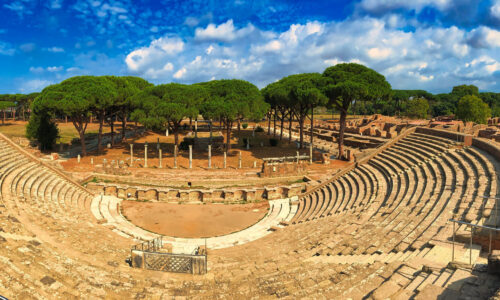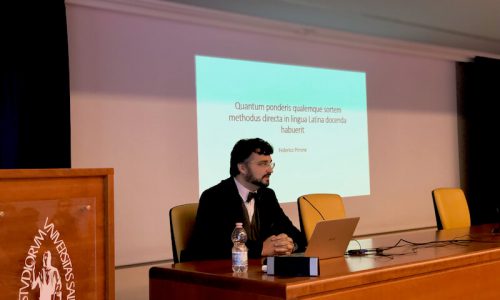Latin 3 – Latin Literature
An indispensable and enriching experience: the origin and goal of the IISC School of Advanced Training! Here, the IISC method bears its fullest fruit, as the student, through a very solid linguistic preparation, becomes autonomous and can access literature without intermediaries, savoring every cultural aspect in a broad sense. This is the essential nourishment for the spirit that the Classics will never cease to offer us!
Overview
Admission
The course is the third year of the School of Higher Studies in Latin.
A sound and excellent knowledge of Latin Language is required. The course may be attended by:
– those who have attended at least the 75% of the course Latin 2;
– those who, having sound knowledge of Latin, might be able to pass the exam Latin 2 even without having attended classes.
Objectives
- In-depth knowledge of the Latin works, covered in class
- Understanding of any Latin text, prose and poems, even of high difficulty, without using the dictionary
- In-depth knowledge of all the most complex structures of Latin syntax and rhetoric
- Knowledge of the 4000 most frequent words in Latin classical literature
- Ability to write and speak in Latin
- Understanding of the basic techniques for teaching a lesson of Latin language through the inductive-contextual methodology.
Program
The course offers students the opportunity to immerse themselves in one of the most emblematic episodes of the Roman Republic in the 1st century BCE: the conspiracy of Catiline, set against the backdrop of the ongoing political and social upheavals that marked the Republic’s final days. Throughout the lessons, students will engage with key passages from Sallust’s renowned work De coniuratione Catilinae and a selection from Cicero’s famous Catilinarians. Our guide will be the booklet Catilina, carefully edited and illustrated by H. H. Ørberg according to the principles of the inductive-contextual method, a hallmark of the IISC’s educational approach. The instructor will also provide or recommend any additional resources useful for a thorough understanding of the assigned texts.
The course will be held in classroom. However, participants who had requested it in the online subscription to the course, may join a virtual classroom and follow the lessons remotely, through a link given by the IISC. Lessons in streaming will be recorded and will stay available for the students to see for a week.
Critical edition of the works for the year 2025/26;
ØRBERG, H.H. (ed.), Catilina. Ex Sallustii Crispi De Catilinae coniuratione libro et M. Tulii Ciceronis orationibus in Catilinam, Edizioni Accademia Vivarium novum, Montella 2008.
For a historical contextualization of the crisis of republican institutions and the works in question, students are encouraged to consult Roman history and Latin literature textbooks of their choice.
Recommended readings for the academic year 2025/26 (the following texts are not required for the exam, but are recommended for those who wish to strengthen their knowledge):
- BOCCHIOLA, M. – SORTORI, M., L’inverno della repubblica: la congiura di Catilina, Mondadori, Milano 2012.
- CANFORA, L., Catilina: una rivoluzione mancata, Laterza, Bari 2023.
- ZULLINO, P., Catilina: l’inventore del colpo di Stato, Rizzoli, Milano 1985.
– Students who have attended at least 75% of class hours may obtain a course completion certificate.
– Those who wish to obtain university certifications (6 CFU/ECTS) should pass the final exam with an evaluation fo at least 18/30. The exam will consist in a written test structured as follows: (a) grammatical competences, (b) comprehension of a written text, (c) writing of a text.
Because of an agreement between the Italian Institute of Classical Studies (IISC) and the Classics Faculty of the Pontifical Salesian University (UPS) – whose titles are recognized by Italian universities – the credits issued at the IISC are automatically aknowledged for the students enrolled at the UPS and may be validated at the Italian universities (without prejudice to the discretion granted to the universities by the Italian law).
The course is also recognized by the MIUR – Regional School Office for Lazio as valid for the professional training of teaching staff.
First lesson
Last lesson
No class days
2025 December, 30
2026 January, 6
2026 March, 31
2026 April, 7
Field Trips
Tarquinia (VT) – Overnight stay from Sat 2026 May, 23 ( 3:00 pm) to Sun 2026 May, 24 (7:00 pm)
Exam sessions
2026 July, 15
2026 September, 16
First lesson
Last lesson
No class days
2024 December, 31
2025 April, 15
2025 April, 22
Exam sessions
2025 June, 18
2025 September, 24
Instructor
Leonardo Rosa Ramos has been teaching Lingua Latina for several years at the Pontificium Institutum Altioris Latinitatis, located at the Pontifical Salesian University and at the Pontificial Athenaeum Sant’Anselmo. Additionally, he is the vice president of the CLENARDVS Association in Lisbon, Portugal, with which he participates in various training and updating projects for teachers.
He earned his PhD in Christian and Classical Letters from the Pontifical Salesian University – Pontificium Institutum Altioris Latinitatis with the thesis “Carminis c.t. ‘De Beata Virgine Dei Matre Maria’, auctore Iosepho de Anchieta, editio didascalica secundum naturae rationem illustrata”.
He participated as a co-author in the edition of the Glossario de termos latinos para a Arqueologia, in two volumes.
He mainly focuses on teaching classical languages and translating texts related to Latinitas Canonica.
You May Like
Latin Conversation and Composition 2
- Dates and times: Tuesday 4:15 - 5:15 pm (February- May)
- Teaching method: in presence and online (live streaming)
Admission The course may be attended by: – professors of Latin and students of Classics; – those who are attending …
History and Theory of Teaching Latin and Greek
- Dates and times: one afternoon per week (November-December)
- Teaching method: in presence and online (live streaming)
Admission Knowledge of Latin and/or Ancient Greek language is required or, alternatively, the attendance of one of the following courses: …
Ancient Greek 1
- Dates and times: Thursday 5:30-7:30 (October-May)
- Teaching method: in presence
Greece will never cease to captivate with the tale of its soul: all it takes is learning to listen to its ancient voice to...

- Start/end dates: 2025 October, 21 - 2026 May, 26
- Teaching method: in presence and online (live streaming)
- Schedule: Tuesday 5:30 - 7:00 p.m.
- Duration: 42 hours (28 lessons)
- Titles released: 6 CFU / ECTS + Course valid for teachers’ updating, recognized by the MIUR
- Language Latin
- Limited enrollment: up to 20 participants
- Academic fees: € 690 (payable in instalments)




